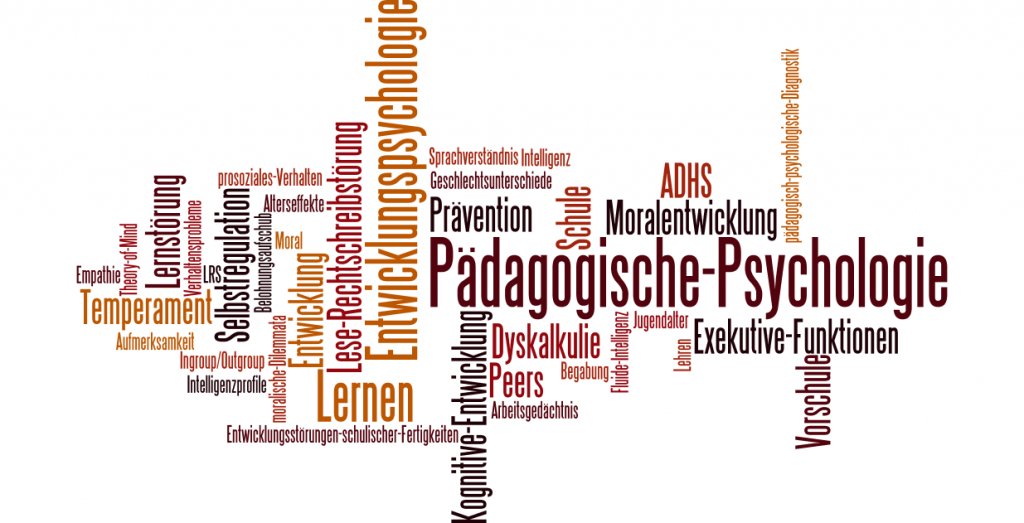Herzlich Willkommen auf der Seite der Professur für Entwicklungspsychologie und Pädagogische Psychologie!

An der Professur für Entwicklungspsychologie und Pädagogische Psychologie beschäftigen wir uns mit dem Lernen in verschiedenen Bereichen und der Entwicklung über die Lebensspanne. Die Professur wird vertreten von Frau Prof. Daseking und ihrem Team.
Unsere Forschungsschwerpunkte sind die Entwicklung pädagogisch-psychologischer Tests, Intelligenztests und Intelligenzdiagnostik, Lernstörungen, exekutive Funktionen und ADHS, Moralentwicklung im Jugendalter und
Bildungsbiografien von geflüchteten Jugendlichen.
Aktuelle Umfragen
Aktuelle Publikationen
2025
Becker, A., Maurer, J. & Daseking, M. (2025). The relationship between language development and behavioral problems in preschool children who experienced a stroke. Zeitschrift für Neuropsychologie, 36 (1), 15–27. https://doi.org/10.1024/1016-264X/a000407
Breit, M., Brunner, M., Preuß, J., Daseking, M., Pauls, F., Walter, F. & Preckel, F. (2025). The contribution of general intelligence to cognitive performance across the life span: A differentiation analysis of the Wechsler tests. Psychology and Aging. Advance online publication. https://doi.org/10.1037/pag0000875
Heinze, H., Daseking, M., Gawrilow, C., Karbach, J. & Kerner auch Koerner, J. (2025). Self-regulation in preschool: Are executive function and effortful control overlapping constructs? Developmental Science, 28(1), e13595. https://doi.org/10.1111/desc.13595
Hogan, M., Fischer, A., Dinçer, B., Yurt, E. C., Daseking, M., Irfan, M. R., Koruga, N., Riddle, R., Quinn, S. (2024). Confirming the factor structure of the Student-Educator Negotiated Critical Thinking Dispositions Scale (SENCTDS). Preprint. file:///C:/Users/dasekinm/Downloads/Confirming%20the%20Factor%20Structure%20of%20the%20SENCTDS%20Irish%20Educational%20Studies-1.pdf
Ibrahim, F., Münscher, J.-C., Daseking, M. & Telle, N.-T. (2025). The Technology Acceptance Model and Adopter Type Analysis in the context of artificial intelligence. Frontiers in Artificial Intelligence, 7. 1496518. https://doi.org/10.3389/frai.2024.1496518
2024
Becker, A. B. C., Maurer, J., Daseking, M. & Pauls, F. (2024). Measurement invariance of the WISC-V across a clinical sample of children and adolescents with ADHD and a matched control group. Journal of Intelligence, 12, 6. https://doi.org/10.3390/jintelligence12010006
Moellmann, H. L., Rana, M., Daseking, M., Petersohn, H. & Rana, M. (2024). Exploring grandiose narcissism among surgeons: a comparative analysis. Scientific Reports, 14(1), 11665. https://doi.org/10.1038/s41598-024-62241-6
Neumann, H., Daseking, M., Thiels, C., Köhler, C. & Lücke, T. (2024). Cognitive development in children with new-onset Rolandic epilepsy and Rolandic discharges without seizures: Focusing on intelligence, visual perception, working memory and the role of parents’ education. Epilepsy & Behavior, 109596. https://doi.org/10.1016/j.yebeh.2023.109596
Schön, S.-M. & Daseking, M. (2024). Externalisierendes Problemverhalten mit Freund:innen im Jugendalter: Welche Rolle spielen Faktoren der emotionalen Unbeteiligtheit? Bundesgesundheitsblatt – Gesundheitsforschung – Gesundheitsschutz, 67, 392–399. https://doi.org/10.1007/s00103-024-03850-4
Schön, S.-M. & Daseking, M. (2024). Do moral emotions interact with self-control and unstructured socializing in explaining rule-breaking behavior committed together with friends? Children, 11, 766. https://doi.org/10.3390/children11070766
Ulitzka, B., Daseking, M. & Kerner auch Koerner, J. (2024). The Marshmallow Test as screenings instrument: Sensitivity and specificity of a delay of gratification tasks as a longitudinal predictor for ADHD and Conduct Problems. https://d197for5662m48.cloudfront.net/documents/publicationstatus/201915/preprint_pdf/17fc6a3452c38cde9f3becde5553376d.pdf
Walter, F., Daseking, M. & Pauls, F. (2024). The effects of language background and parental education on measures of cognitive ability: An analysis of the WPPSI-IV cognitive profiles of monolingual, simultaneous bilingual, and successive bilingual German children aged 4 to 7 years. Children, 11, 631. https://doi.org/10.3390/children11060631
Stellenangebote / Bachelorarbeitsthemen
Wir betreuen regelmäßig Bachelorarbeiten, sprechen Sie uns gerne direkt an: Team
Stellenangebote / Masterarbeitsthemen
Wir betreuen regelmäßig Masterarbeiten, sprechen Sie uns gerne direkt an: Team